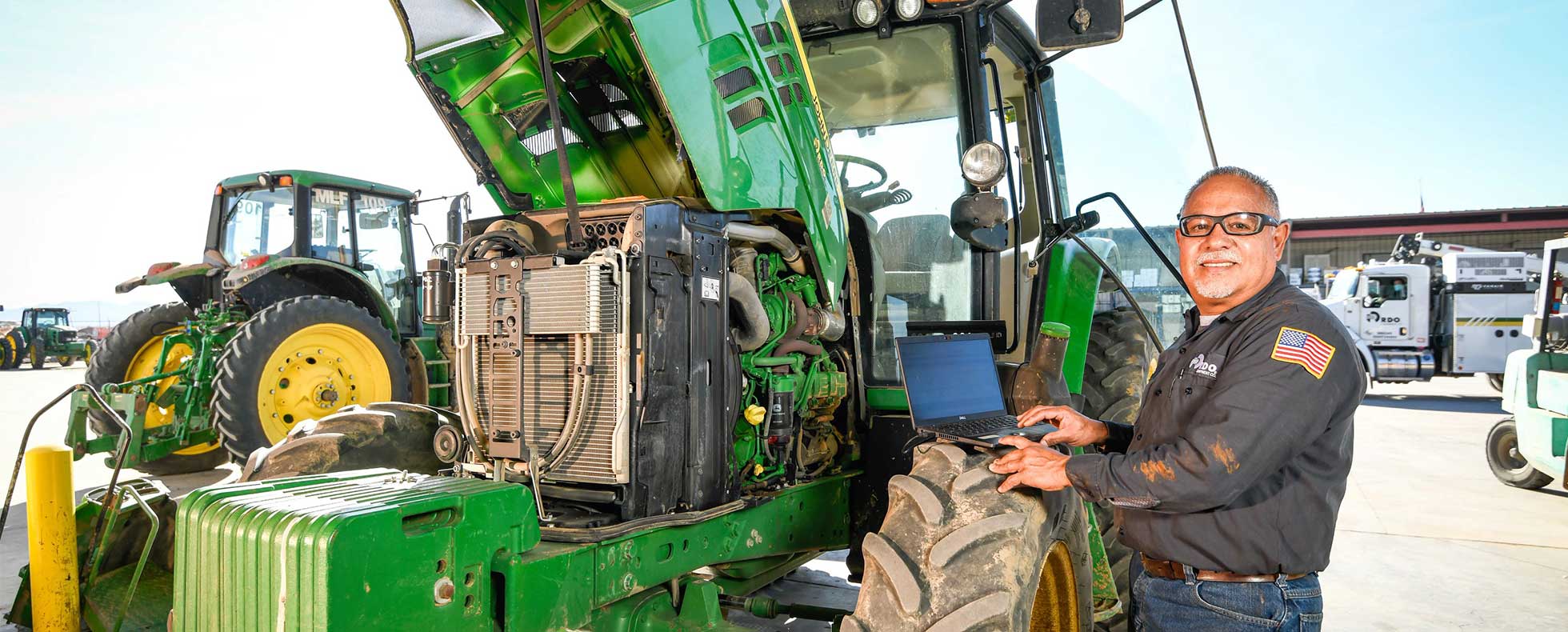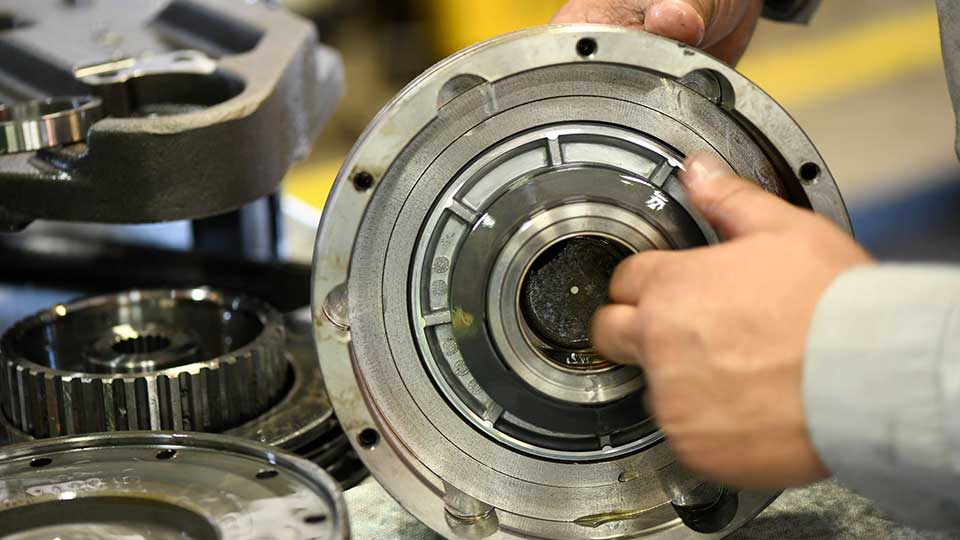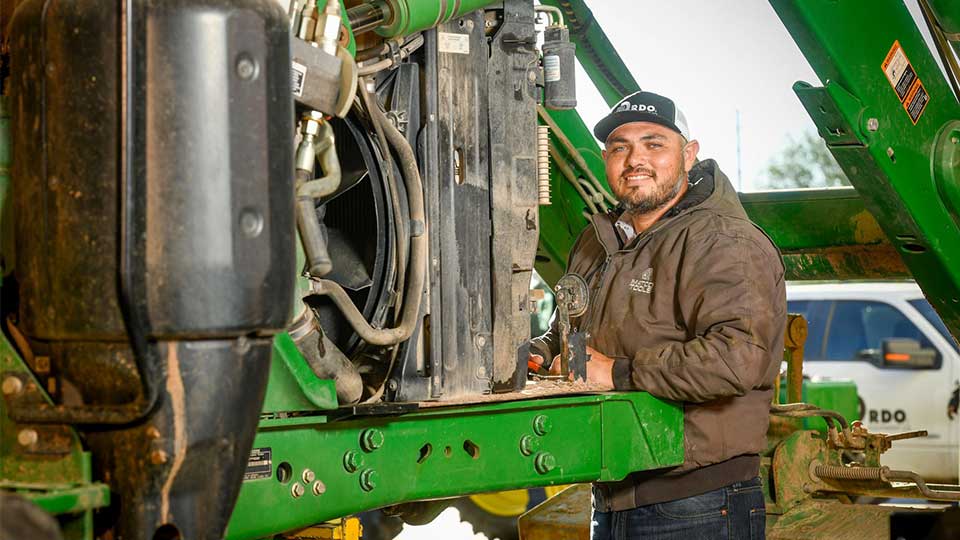
You want to have a successful, long career as a technician. The work you’re doing is important and you try to get better, in one way or another, every day.
As a diesel mechanic, you really are the backbone of your company. Every time you fix a piece of machinery or answer a customer’s question, you create value and your work leaves an impact.
Being a diesel mechanic certainly has its challenges, but they don’t need to dictate your success.
RDO Equipment Co. has been helping technicians build careers they’re proud of for more than 50 years. As a service manager here, I’m constantly looking at ways to help my technicians grow and become more successful.
To help you do the same, in this article, I’ll outline eight important skills to develop as a diesel mechanic. I’ll also provide some tips for developing them so you can be successful, no matter where your career takes you.
As we move further into the digital age, technology is entering every job. Diesel mechanics, from the trucking world to the heavy equipment industry, use technology every day.
At RDO, for example, our technicians use software like John Deere Service Advisor to assist with nearly every job. Additionally, technology shows up in the systems we use for internal communication and work-order processing.
Being able to learn these systems, relatively quickly (with the proper training, of course), is a good skill to develop as a technician.
Tip: When you have a question, don’t be afraid to ask. There are no dumb questions, especially when using complex technologies you’re not familiar with.
Connect with your supervisor, shop mentor or a trusted colleague who seems to have a good handle on the technology and ask them to show you how to use them.
While great mechanical/wrenching skills are important to your success as a technician, being able to figure out an issue’s cause so you can make the proper fix is just as crucial.
Mechanics who are great at troubleshooting and diagnostics are often far more efficient than those who struggle in these areas (efficiency can help you advance your career as a mechanic).
Working in a service shop — or on your own as a field technician — is all about performing quality work as safely and efficiently as you can. As you progress in your career and get more familiar with a manufacturer or set or products, you’ll get better at this naturally.
Tip: To move along in this area faster, work closely with veteran techs who are great at troubleshooting and diagnostics. Whenever you hit a roadblock or make a mistake, record this for later so you remember and ask questions of tenured technicians.
Working for a company that offers comprehensive mechanic training is another way to get better at diagnostics quicker.
This is a big one. Over my time working with technicians, people who can remember things about the machinery they’re working on, based on experiences they’ve had or training they’ve taken, can become really successful.
As your career advances, recalling previous repairs you’ve done on a machine when a certain issue occurred and using that knowledge to make the right diagnosis and repair when a customer tells you their problem, will come in handy.
Tip: Developing this skill will take some time and studying. Make sure to stay up to date with the training your company provides. The more information you take in and the more repairs you perform, the better you’ll get at this.

There are more than 300,000 diesel mechanics in the U.S., a portion of these work in the same industry as you. Many wrench for a competitor.
The great diesel technicians don’t become that way by accident.
These professionals are self-motivated and take pride in making themselves and their companies the best in the business.
Self-motivation can mean a lot of different things, including:
Throughout your career being a self-motivated, productive member of your shop will pay dividends frequently.
Tip: If you’re passionate about what you do, this won’t be a difficult skill to develop.
However, if you struggle a bit with motivation, attach yourself to the passionate people around you. Find a couple of colleagues who really enjoy coming to work every day and spend time with them. Observe the way these people carry themselves and how they approach each day, this will help you get out of your rut.
Many technicians are in charge of owning a portion of each customer relationship.
Having great customer service skills is an often overlooked skill in this industry. But it’s still very important for managing customer interactions and accounts.
As a mechanic, it’s your job to explain things to your customer in terms they can understand and build trust with them as a resource. Learning how to communicate and build relationships with customers is something you should work on (if you struggle with it).
Tip: If you’re new to this aspect of the job, it can be intimidating. Learning from each interaction you have with customers will help you get better. Asking for assistance will also help. Your supervisor will happily role-play customer interactions with you, if needed and give you instructions on how to improve. Although it might be uncomfortable at first, if you want to improve your customer service skills, asking for assistance can go a long way.
As you look to develop as a mechanic, being able to take constructive feedback from peers, mentors and leaders is important.
Try your best to remove your ego from this process. Instead, if someone gives you feedback on a repair you performed or an aspect of your work, take it in stride.
It’s easy to overlook feedback as just another person’s opinion and that it doesn’t apply to you. This mindset won’t help your growth. Instead, take an extra second to evaluate who’s giving you the feedback and if it might be a relevant critique.
Is a veteran technician offering information that could help you down the road? If so, it’s worth incorporating this information.
Tip: Rarely is feedback meant to put you down or make you feel insignificant. Try your best not to take feedback personally. Instead, ask follow-up questions and take a genuine interest when someone is trying to help you. This can be a really valuable skill as you move through your career.

The seventh skill on this list is all things communication — written and verbal.
Your job as a mechanic involves both of these communication skills to be successful.
On the written side, you need to be able to write up complete work orders. These work orders, like we say at RDO, should tell the “story” of the job in a way that’s easy for the customer to understand.
The goal here is to hand the customer an explanation of the work performed and have them go, “Okay, yeah, that makes sense.” This is a great skill to develop.
Verbally, you’re constantly in communication with people throughout your day whether it’s the parts people, other technicians, your supervisor or the customer.
Developing good verbal communication skills so you can ask and answer questions, have good relationships with them and get work done safely will take you far as a mechanic.
Tip: Take advantage of any training your company offers for these skills. At RDO, for example, every technician is given technical writing training to help them improve these skills.
As a service manager, I find flexibility and adaptability to be valuable skills in a technician. Interestingly enough, being an adaptable mechanic comes down to having many of the other skills on this list.
Good communication skills mean you can work with a variety of people — that’s adaptable.
Troubleshooting and diagnostics skills across equipment types means you can work on all kinds of machinery (dozers, tractors, backhoes, etc.) that’s adaptable.
Being self motivated means you’re open to learning new things and can be depended on to think outside of the box to solve a problem — the picture of adaptability.
Tip: As you develop more skills over time, you’ll become more adaptable. To become a more successful mechanic, and make more money over the course of your career, you want to become your company’s “swiss army knife.” Apply yourself to becoming one percent better each day and adaptability will follow.
The skills you develop starting right now will help you build a great career.
Over my years working with and leading technicians, the best ones have skills like adaptability, information retention, communication, customer service and troubleshooting/diagnostics.
Along with skill development, here are 6 Tips for Advancing Your Diesel Mechanic Career.
At the end of the day, having an employer that prioritizes your development and rewards your ambition can also help. Here are some tips for choosing your next employer.
RDO is proud to be a premier employer of service technicians in more than 80 locations across 12 states.
Learn more about what it’s like to work as a service technician by visiting our service technician page.
For more information on a career at RDO, and how we can help you develop these skills, contact our careers team. We’re more than happy to help you on your journey toward building a career you’re proud of.